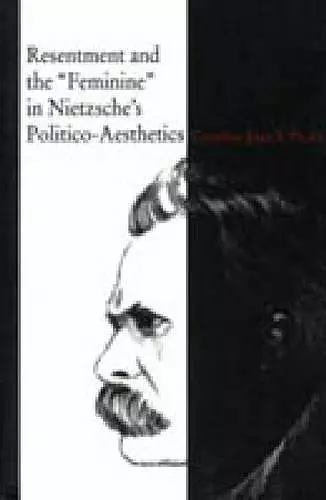Resentment and the “Feminine” in Nietzsche’s Politico-Aesthetics
Format:Hardback
Publisher:Pennsylvania State University Press
Published:1st Apr '99
Currently unavailable, and unfortunately no date known when it will be back
This hardback is available in another edition too:
- Paperback£34.95(9780271018898)

Nietzsche's remarks about women and femininity have generated a great deal of debate among philosophers, some seeing them as ineradicably misogynist, others interpreting them more favorably as ironic and potentially useful for modern feminism. In this study, Kay Picart uses a genealogical approach to track the way Nietzsche's initial use of "feminine" mythological figures as symbols for modernity's regenerative powers gradually gives way to an increasingly misogynistic politics, resulting in the silencing and emasculation of his earlier configurations of the "feminine."
While other scholars have focused on classifying the degree of offensiveness of Nietzsche's ambivalent and developing misogyny, Picart examines what this misogyny means for his political philosophy as a whole. Picart successfully shows how Nietzsche's increasingly derogatory treatment of the "feminine" in his post-Zarathustran works is closely tied to his growing resentment over his inability to revive a decadent modernity.
“A significant contribution to both Nietzsche scholarship and feminist theory, Picart’s well-written book insightfully shows how Nietzsche’s myths of femininity are central to his political philosophy. Her treatment of the evolution of Nietzsche’s ideas is especially impressive.”
—Kelly Oliver, SUNY, Stony Brook
“Resentment and the “Feminine” in Nietzsche’s Politico-Aesthetics is stimulating, challenging, and an immense joy to read.”
—Paul Kingsburgy Feminism and Philosophy
“Picart’s book is a sustained and consistent treatment of resentment targeted at Nietzsche himself, using his own genealogical method. Well informed by feminist theory and recent scholarship in political philosophy, while at the same time appropriately attentive to the artistic dimensions of Nietzsche’s thought and arguably all thought as it purports to deal with the question of the feminine, it is one of the most scathing critiques of Nietzsche to emerge in the decade of the 1990s, and all the more scathing insofar as it reveals a genuine knack for turning the thoughts of the master over and against him. I expect that readers of Nietzsche will find much to admire and to question in this bold book, and it is not otherwise with Nietzsche’s writings themselves.”
—Andrian Del Caro Journal of Nietzsche Studies
ISBN: 9780271018881
Dimensions: 229mm x 152mm x 17mm
Weight: 454g
216 pages